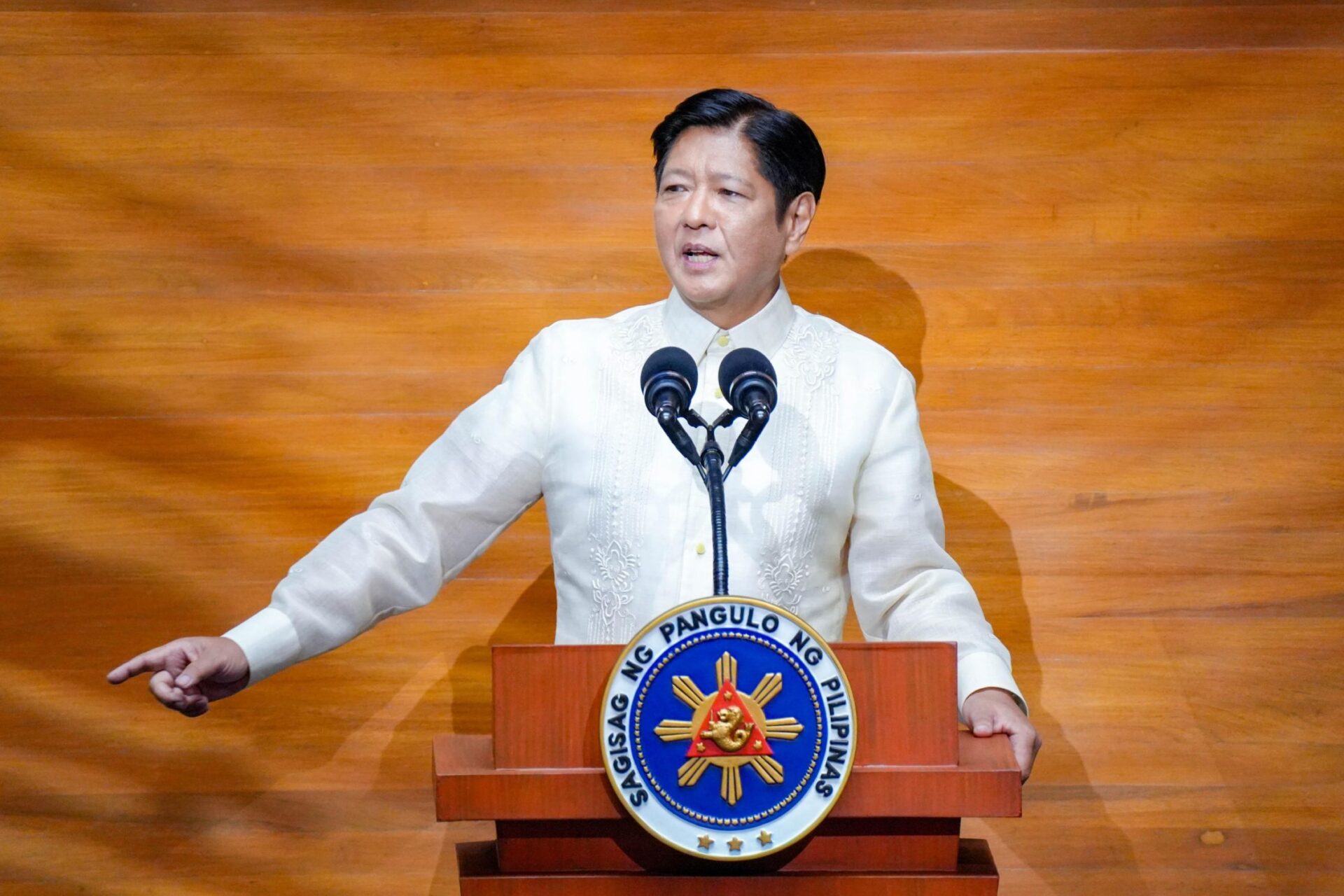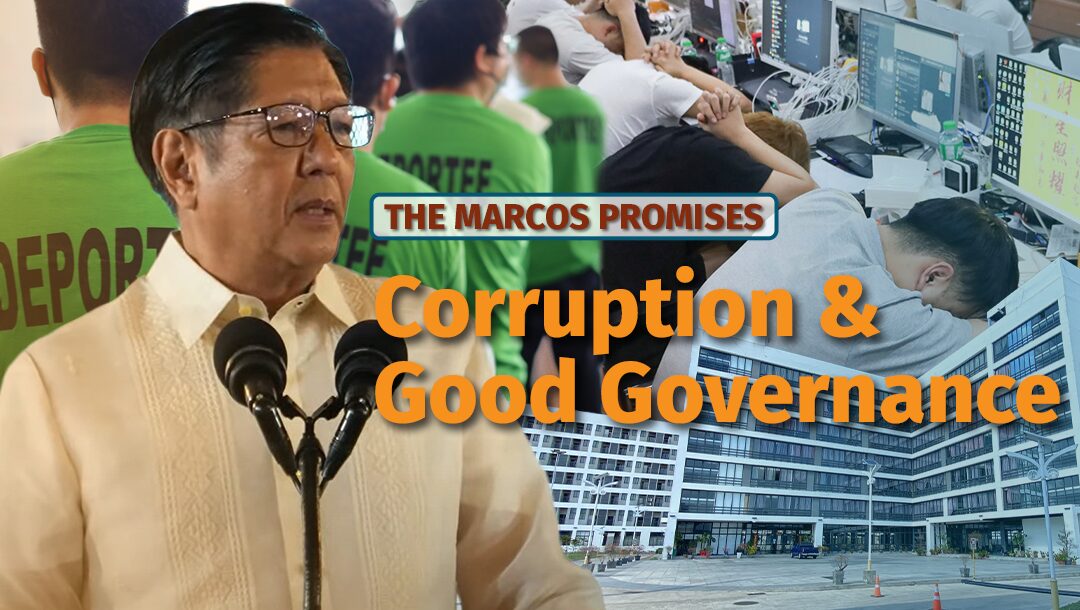This article was first posted on July 21, 2025
“Lagi po nating labanan ang mali at ang masama. Lagi po nating ipaglaban ang tama at ang mabuti (Let us always fight wrong and evil. Let us always fight for what is right and good).”
President Ferdinand Marcos Jr. ended his State of the Nation Address on July 22, 2024 with these words after ordering a total ban on Philippine offshore gaming operators, which have been linked to various criminal activities such as financial scamming, money laundering, prostitution, human trafficking, kidnapping, brutal torture, even murder.
And then, he said: “Lagi po nating mahalin ang Pilipinas. Lagi po nating mahalin ang Pilipino (Let us always love the Philippines. Let us always love the Filipinos).”
The president delivers the SONA every fourth Monday of July before a joint session of the Senate and the House of Representatives, after they convene separately in the morning. The occasion serves as a vehicle for the chief executive to report on the administration’s accomplishments and plans on the economy and other sectors. It’s an opportunity for him to lay down his legislative priorities and give his marching orders to the various government agencies to revitalize the economy and deal with pressing concerns.
In Marcos’ first three SONAs from 2022 to 2024, VERA Files tracked a total of 165 promises or issues his administration has vowed to address..
Halfway through his six-year term, only 42 or 25.45% of those promises have been fulfilled while 91 or 55.15% are in progress or still being implemented. The remaining 28 (16.97%) have been stalled, mostly in the legislature, and 4 (2.42%) have failed.
Economy
He has achieved more in the economic sector, fulfilling 11 (roughly 35%) of 31 promises, but failed in five. Another 11 are in progress and six were stalled, including five in the legislature.
The administration continues to struggle with the country’s economic growth targets, which the president had set in his first SONA at 6.5%-8.0% from 2023 to 2028, when his term ends. While the economy posted 7.6% gross domestic product growth in 2022, exceeding the target of 6.5%-7.5% for that year, the government has missed the mark in the last two years under Marcos.
This has forced the administration to revise its GDP forecasts since the 2022 SONA.
The economy grew by only 5.6% in 2023. It posted the same GDP growth last year, still below the country’s revised target of 6.0%-6.5% for 2024.
Energy and Environment
In the energy and environment sector, only two of 18 promises have been fulfilled: the enactment of the Loss and Damage Fund Board Act (Republic Act No. 12019) on Aug. 28, 2024 and RA 12120, establishing the Philippine Downstream Natural Gas Industry to be developed by the Department of Energy, signed into law last Jan. 8.
Marcos asked Congress last year to pass the Loss and Damage Fund Board Act after the country won the bid to host the board of the Loss and Damage Fund.
The Fund, backed by the United Nations Framework Convention on Climate Change, has an initial $700-million pledge for developing countries recovering from losses caused by climate change. The law activates resources so the Philippines can host the board and provides a whole-of-government approach to solutions to climate change problems.
Under RA 12120, the government is offering to provide tax and other incentives to investors in natural gas to increase the country’s power supply.
Corruption and Good Governance
In the fight against corruption and for good governance, only two of 10 promises have been fulfilled: a total ban on POGOs and the enactment in 2023 of the Internet Transaction Act or E-Commerce Law (RA 11967).
By the end of 2024, all 304 POGO sites registered with the Philippine Amusement and Gaming Corporation had been shut down across the country, according to the gaming regulator. But PAGCOR senior vice president Raul Villanueva said in a Senate hearing in February that smaller illegal offshore gaming groups still exist.
Marcos’ directive to the various agencies to ensure that every centavo of the national budget will be “judiciously spent for urgent priorities and socially impactful programs” is in progress.
The Department of Budget and Management reported that P4.83 trillion or 99% of the P4.9 trillion cash allocations it released in 2024 had been utilized, higher than the 98% utilization rate for 2022 and 2023.
However, corruption allegations are hounding the 2025 spending plan. A petition pending before the Supreme Court seeks to declare unconstitutional the P26.16-billion funding for the Ayuda para sa Kapos ang Kita Program, which critics view as “effectively constitut[ing] pork barrel.” The pork barrel, previously budgeted in lump sum as Priority Development Assistance Fund, is a congressional discretionary fund declared illegal by the High Court in 2013.
Agriculture
Three years after Marcos vowed to enhance the country’s food security by revitalizing the agriculture industry, eight of his agriculture-related promises are still in progress, five have been fulfilled and three priority legislations were stuck in limbo.
In his 2024 SONA, the president highlighted the challenges faced by Filipinos amid the rising food prices and vowed to prioritize enhancing local production. Among eight agriculture-related promises from last year, only one has been fulfilled. The other seven remain in progress.
Marcos has been vocal about his “aspiration” to bring down rice prices to as low as P20 per kilo since he was campaigning for the presidency in 2022.
To stay true to his words, the chief executive, who was also Agriculture secretary from July 2022 to November 2023, and the Department of Agriculture have launched more Kadiwa stores nationwide where rice is available at P20/kilo.
However, the average price per kilo of local commercial rice in Metro Manila still ranges from P38 to P57. In February, the “extraordinary” rise in the prices of rice prompted the DA to issue a food security emergency to bring these down.
Labor
Midway through its term, the Marcos administration still lags in addressing joblessness in the country.
In May 2022, a month before Marcos took office, the Philippine Statistics Authority recorded over 2.93 million unemployed Filipinos. That figure has gone down year-on-year since then, with the PSA reporting 2.03 million jobless individuals in May 2025.
However, efforts to reduce underemployment — when employed persons seek additional hours of work or look for additional jobs — have faced a setback. From 6.67 million in May 2022, the number of underemployed individuals steadily declined, reaching a low of 4.82 million in May 2024. But from January to June this year, underemployment has gone up to 6.6 million.
Citing the need to cope with inflation and maintain a competitive workforce, Marcos announced a wage hike and an additional allowance for all state employees.
In August 2024, he issued Executive Order No. 64, mandating four tranches of salary increases for government workers in the executive, legislative, judiciary and constitutional commissions set to be completed by 2027. The DBM has so far allocated P106 billion for the first two phases of the wage hike in 2024 and 2025. Civilian government staff stand to receive up to P7,000 in medical allowances starting 2025. DBM has allocated P9.5 billion for the program this year.
Infrastructure
Of the president’s 16 promises in infrastructure during his first three SONAs, only three have been fulfilled, 10 remain in progress and three were stalled.
As of June 2025, the administration has 207 Infrastructure Flagship Projects worth US$178 billion. Eight of these have been completed, 70 are ongoing and 23 are approved for implementation. The rest are either awaiting government approval, under the preparation stage or still in the pre-project preparation phase.
In addition to the IFPs, the administration also has 3,224 infrastructure projects under the Philippine Development Plan’s 2023-2028 Public Investment Program amounting to US$ 225.1 billion.
One of the big-ticket projects accomplished in 2024 is the Panguil Bay Bridge, the longest sea-crossing bridge in Mindanao. Other completed IFPs include the Expanded Plaridel Bypass Road inaugurated in October 2024 and the Samar Coastal Road Project that opened in 2023. Last November, Marcos also inaugurated the LRT-1 Cavite Extension Project Phase 1 that traverses Parañaque City and Quezon City.
Education
For the first time in history, state funding for education breached the P1-trillion mark.
Spread across different education agencies and institutions, P1.05 trillion was allocated to the sector in the 2025 General Appropriations Act “to boost growth and inclusion,” said Economic Planning and Development Secretary Arsenio Balisacan.
This coincides with more long-term changes to the education system promised by President Ferdinand Marcos Jr. in his 2024 SONA. Four of these five promises target major changes in the basic education curriculum and long-term adoption of initially short-term programs.
“[The president] would like us to fast-track some of the actions, dahil nakita niya ‘yung (because he saw the) urgency and it’s a very deep-seated problem,” said Education Secretary Juan Edgardo “Sonny” Angara.
Social Services
Marcos racked up 29 promises on social services since he took office three years ago, 20 of them made in his first two SONAs. Of the total, six have been fulfilled, 19 remain in progress, the rest are stalled.
The administration has had the most setbacks addressing issues of healthcare professionals, particularly on allowances due them since 2021 for their work during the pandemic.
It also drew flak after the 19th Congress failed to pass the proposed Magna Carta for Barangay Healthcare Workers, which would have granted proper compensation and benefits for primary health providers.
Another promise related to COVID-19 was stalled when the government did not allocate a budget for vaccine procurement, made worrisome given the emergence of the Nimbus subvariant this June.
Setbacks aside, the administration had some wins, fulfilling pledges dealing mostly with health and nutrition.
Foreign Relations
In his past three SONAs, Marcos has consistently vowed to stand firm on his administration’s independent foreign policy and defense of the country’s sovereign rights in the West Philippine Sea while maintaining good relations with other countries.
To solidify the country’s position in the WPS, the president signed two landmark laws in November last year: the Philippine Maritime Zones Act and the Philippine Archipelagic Sea Lanes Act.
These, according to Senior State Counsel Fretti Ganchoon, will ensure that all existing Philippine laws related to maritime zones are updated and consistent with the United Nations Convention on the Law of the Sea and guide all agencies dealing with the WPS controversy.
The government has also made efforts to strengthen public awareness and knowledge of WPS through a comic book launched in January this year that debunks “China’s disinformation and false narratives” on the issues surrounding this part of the South China Sea.
Armed Forces
Strong opposition from active-duty officers of the Armed Forces of the Philippines and other uniformed services against mandatory contribution to their pension has stalled legislation of a measure for a unified pension system for this law enforcement sector.
The reform measure, which was intended to prevent a “fiscal collapse” in a few years, was in the top priority list of the Legislative Executive Development Advisory Council’s common legislative agenda from 2022 until June 2024, when it was relegated to “second priority.”
Also in his 2022 SONA, Marcos sought an amendment to the 1935 National Defense Act “to provide a change in the military structure of the AFP that is more responsive to the current and future nonconventional security threats to the country’s territorial integrity and national sovereignty.”
After more than two years, Congress delivered the measure, now known as Republic Act No. 12024, or the Philippine Self- Reliant Defense Posture Program Act, signed into law on Oct. 8. 2024.
The bill that revives both the mandatory Reserve Officers’ Training Corps and National Service Training Program has been stalled in the legislature.
Peace Process
The past year saw delays in some of the administration’s biggest peacemaking commitments: the Bangsamoro parliamentary elections and peace talks with the National Democratic Front of the Philippines.
Postponed a second time since the 2019 establishment of the Bangsamoro Autonomous Region in Muslim Mindanao, the first Bangsamoro parliamentary elections will now be held on Oct. 13 instead of coinciding with the May 12 national and local elections.
Lawmakers reset the Bangsamoro polls after the Supreme Court ruled on Sept. 9, 2024 to exclude Sulu from the BARMM since its residents voted against the ratification of the Bangsamoro Organic Law in the 2018 referendum.
Peace negotiations with the Communist Party of the Philippines, through its political wing the NDFP, are “[pushed] to the brink of collapse,” said CPP interim chair Julieta De Lima in an Oct. 28, 2024 statement.
Drugs and Crime
Marcos did not say anything about the drug war in his first SONA in July 2022 nor was there any mention about human rights in his speech that lasted 74 minutes.
The following year, he declared: “We will relentlessly continue our fight against drug syndicates, shutting down their illegal activities – we will shut down their activities and dismantle their network of operations.”
This was a mere reiteration of his 2022 declared policy to continue the fight against narcotics, which, he said, “has taken on a new face,” focusing more on community-based treatment, rehabilitation and reintegration of drug-dependent users – a huge turnaround from his predecessor’s bloody war against illegal drugs.
In his 2024 SONA, Marcos restated his “bloodless” fight against illegal drugs. “Our bloodless war on dangerous drugs adheres, and will continue to adhere, to the established ‘8 Es’ of an effective anti-illegal drugs strategy. Extermination was never one of them,” he said.
However, the Dahas Project of the University of the Philippines’ Third World Studies Center documented 362 drug-related killings in the second year of Marcos’ administration, from July 1, 2023 to June 30, 2024, exceeding the 342 killings reported in the previous year. Its report said state agents were responsible for 34% of the killings.
But data from the Philippine Drug Enforcement Agency showed a much lower number of drug-related deaths in the last three years: 271 killed during operations, less than 5% of the 6,259 recognized by the police in the six years of the previous administration.
As of July 7, Dahas Project recorded 1,009 drug-related killings in the first three years of the Marcos administration.
Find out more about what the Marcos administration has achieved—and what it did not—in our midterm SONA Promise Tracker






